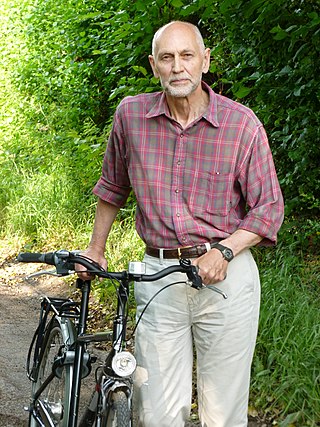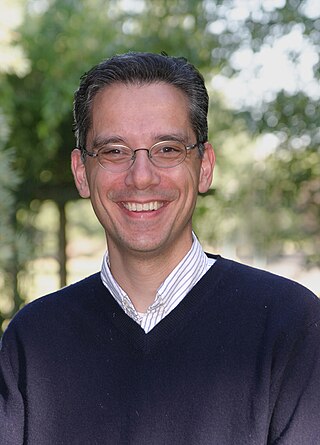Related Research Articles
The Lakatos Award is given annually for an outstanding contribution to the philosophy of science, widely interpreted. The contribution must be in the form of a monograph, co-authored or single-authored, and published in English during the previous six years. The award is in memory of the influential Hungarian philosopher of science and mathematics Imre Lakatos, whose tenure as Professor of Logic at the London School of Economics and Political Science (LSE) was cut short by his early and unexpected death. While administered by an international management committee organised from the LSE, it is independent of the LSE Department of Philosophy, Logic, and Scientific Method, with many of the committee's members being academics from other institutions. The value of the award, which has been endowed by the Latsis Foundation, is £10,000, and to take it up a successful candidate must visit the LSE and deliver a public lecture.
John Earman is an American philosopher of physics. He is an emeritus professor in the History and Philosophy of Science department at the University of Pittsburgh. He has also taught at the University of California, Los Angeles, Rockefeller University, and the University of Minnesota, and was president of the Philosophy of Science Association.

Nancy Cartwright, Lady Hampshire is an American philosopher of science. She is a professor of philosophy at the University of California at San Diego and the University of Durham. Currently, she is the President of the Division for Logic, Methodology and Philosophy of Science and Technology of the International Union of History and Philosophy of Science and Technology.

Gregory Paul Currie FAHA is a British philosopher and academic, known for his work on philosophical aesthetics and the philosophy of mind. Currie is Professor of Philosophy at the University of York and Executive Editor of Mind & Language.
Daniel Kolak is a Croatian-American philosopher who works primarily in philosophy of mind, personal identity, cognitive science, philosophy of science, philosophy of mathematics, philosophy of logic, philosophy of religion, and aesthetics. He is professor of philosophy at the William Paterson University of New Jersey and an Affiliate of the Rutgers University Center for Cognitive Science (RuCCS). Kolak is the founder of the philosophical therapy known as cognitive dynamics.

Gregory Wheeler is an American logician, philosopher, and computer scientist, who specializes in formal epistemology. Much of his work has focused on imprecise probability. He is currently Professor of Philosophy and Computer Science at the Frankfurt School of Finance and Management, and has held positions at LMU Munich and the New University of Lisbon. He is a member of the PROGIC steering committee, the editorial boards of Synthese, and Minds and Machines, and was the editor-in-chief of Minds and Machines from 2011 to 2016. In 2019 he co-founded Exaloan AG, a financial technology company based in Frankfurt. He obtained a Ph.D. in philosophy and computer science from the University of Rochester under Henry Kyburg.
In the philosophy of science, structuralism asserts that all aspects of reality are best understood in terms of empirical scientific constructs of entities and their relations, rather than in terms of concrete entities in themselves.

Lee Cameron McIntyre is an American author, researcher, and academic. He is a research fellow at the Center for Philosophy and History of Science at Boston University and an instructor in ethics at Harvard Extension School. He has published numerous nonfiction book and articles on the philosophy of the social sciences and attempts to undermine science. In 2023, he became a fellow with the Committee for Skeptical Inquiry.

Gualtiero Piccinini is an Italian–American philosopher known for his work on the nature of mind and computation as well as on how to integrate psychology and neuroscience. He is Curators' Distinguished Professor in the Philosophy Department and Associate Director of the Center for Neurodynamics at the University of Missouri, St. Louis.

Stephan Hartmann is a German philosopher and Professor of Philosophy of Science at Ludwig Maximilian University of Munich, known for his contributions to formal epistemology.
Eduardo Barrio is an Argentine logician.
In philosophy, Weyl's tile argument, introduced by Hermann Weyl in 1949, is an argument against the notion that physical space is "discrete", as if composed of a number of finite sized units or tiles. The argument purports to show a distance function approximating Pythagoras' theorem on a discrete space cannot be defined and, since the Pythagorean theorem has been confirmed to be approximately true in nature, physical space is not discrete. Academic debate on the topic continues, with counterarguments proposed in the literature.
Richard Bradley is a South African philosopher. He is a professor at the London School of Economics and Political Science, a project leader at the Centre for Philosophy of Natural and Social Science, and the former editor of the journal Economics and Philosophy.

The Quine–Putnam indispensability argument is an argument in the philosophy of mathematics for the existence of abstract mathematical objects such as numbers and sets, a position known as mathematical platonism. It was named after the philosophers Willard Quine and Hilary Putnam, and is one of the most important arguments in the philosophy of mathematics.
Dutch philosophy is a broad branch of philosophy that discusses the contributions of Dutch philosophers to the discourse of Western philosophy and Renaissance philosophy. The philosophy, as its own entity, arose in the 16th and 17th centuries through the philosophical studies of Desiderius Erasmus and Baruch Spinoza. The adoption of the humanistic perspective by Erasmus, despite his Christian background, and rational but theocentric perspective expounded by Spinoza, supported each of these philosopher's works. In general, the philosophy revolved around acknowledging the reality of human self-determination and rational thought rather than focusing on traditional ideals of fatalism and virtue raised in Christianity. The roots of philosophical frameworks like the mind-body dualism and monism debate can also be traced to Dutch philosophy, which is attributed to 17th century philosopher René Descartes. Descartes was both a mathematician and philosopher during the Dutch Golden Age, despite being from the Kingdom of France. Modern Dutch philosophers like D.H. Th. Vollenhoven provided critical analyses on the dichotomy between dualism and monism.
Russell Marcus is a philosopher specializing in philosophy of mathematics and the pedagogy of philosophy. He is Chair of Philosophy at Hamilton College and president of the American Association of Philosophy Teachers.
Computational philosophy or digital philosophy is the use of computational techniques in philosophy. It includes concepts such as computational models, algorithms, simulations, games, etc. that help in the research and teaching of philosophical concepts, as well as specialized online encyclopedias and graphical visualizations of relationships among philosophers and concepts. The use of computers in philosophy has gained momentum as computer power and the availability of data have increased greatly. This, along with the development of many new techniques that use those computers and data, has opened many new ways of doing philosophy that were not available before. It has also led to new insights in philosophy.
Heather Battaly is a professor of philosophy at the University of Connecticut specializing in virtue epistemology and epistemic virtues and vices. She is editor-in-chief of the Journal of Philosophical Research and the Journal of the American Philosophical Association.
David Liggins is a philosopher at the University of Manchester with research interests in metaphysics and philosophy of mathematics.
Joseph Melia is a philosopher working in the areas of philosophy of mathematics, modal logic and possible worlds. He has made important contributions to the debate over the Quine–Putnam indispensability argument, where he argues for a "weaseling" approach to mathematical nominalism. He has also argued against modalism and the modal realism of David Lewis.
References
- ↑ Frigg, Roman; Professor Roman Frigg at lse.ac.uk. Accessed 2017-09-07.
- ↑ "Frigg, Roman - Munich Center for Mathematical Philosophy (MCMP) - LMU Munich". www.mcmp.philosophie.uni-muenchen.de. Retrieved 2024-02-17.
- ↑ Professor Roman Frigg has won the Alexander von Humboldt Foundation’s prestigious Bessel Research Award at lse.ac.uk, 2016/05/10.
- ↑ Frigg, Roman (2003). Re-presenting scientific representation (phd thesis). London School of Economics and Political Science (United Kingdom).
- 1 2 3 Cartwright, Nancy; Ward, Keith (2016). Rethinking Order: After the Laws of Nature. London: Bloomsbury Publishing. p. 55. ISBN 978-1-4742-4406-0.
- 1 2 Toon, Adam (2012). Models as Make-Believe: Imagination, Fiction and Scientific Representation. New York: Palgrave Macmillan. p. 17. ISBN 978-0-230-30121-4.
- 1 2 Weisberg, Michael (2013). Simulation and Similarity: Using Models to Understand the World. New York: Oxford University Press. p. 46. ISBN 978-0-19-993366-2.
- ↑ Walton, Kendall L. "Mimesis as Make-Believe: On the Foundations of the Representational Arts". Harvard University Press, 1990